Unit 13 We're trying to save the earth!单元教案(表格式 5课时)
文档属性
| 名称 | Unit 13 We're trying to save the earth!单元教案(表格式 5课时) | 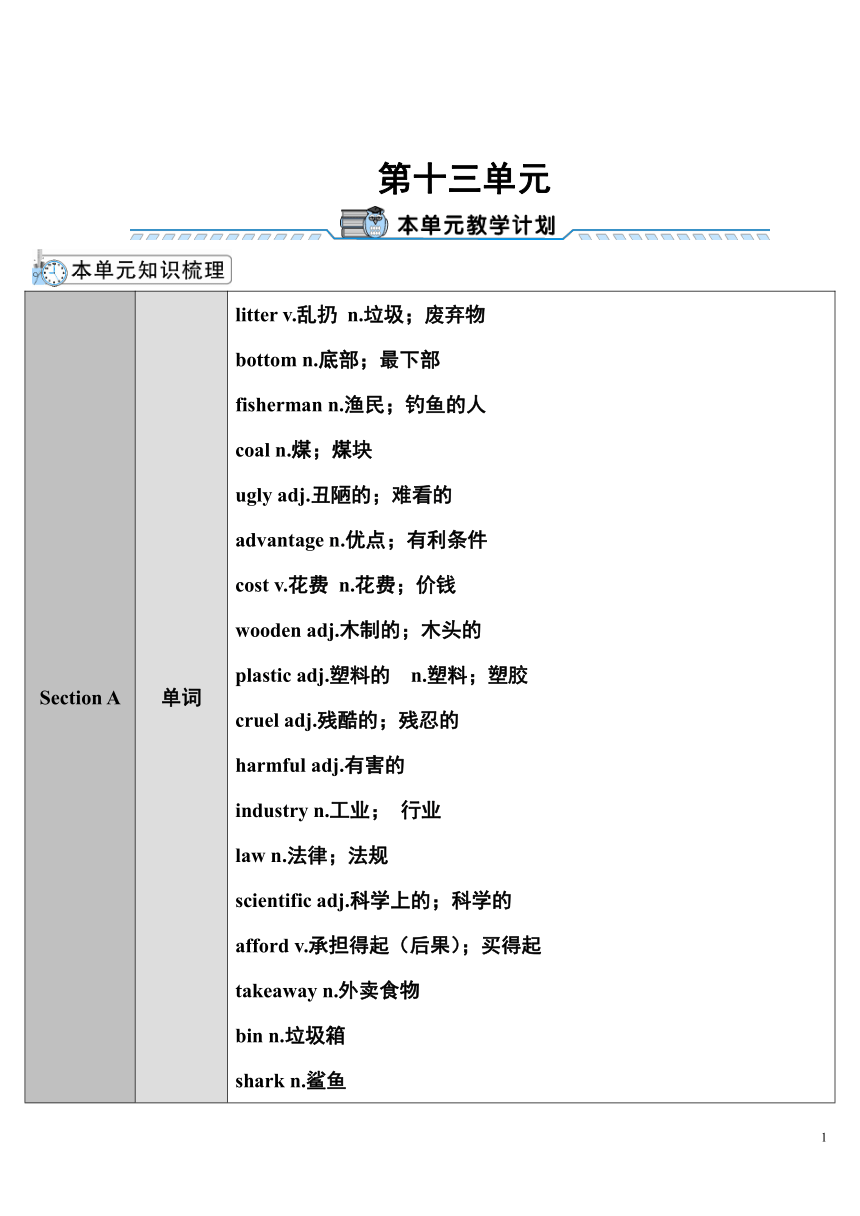 | |
| 格式 | doc | ||
| 文件大小 | 246.5KB | ||
| 资源类型 | 教案 | ||
| 版本资源 | 人教新目标(Go for it)版 | ||
| 科目 | 英语 | ||
| 更新时间 | 2023-09-29 15:13:37 | ||
图片预览

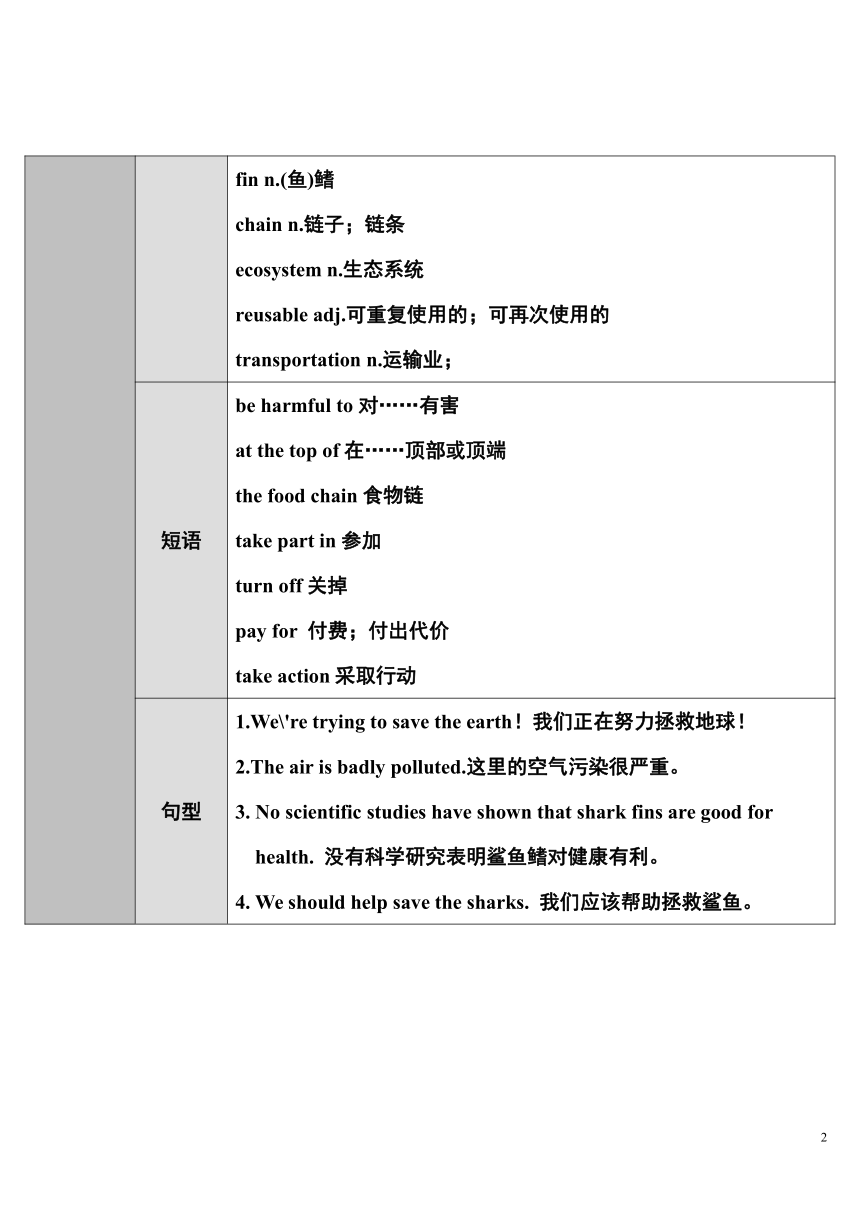
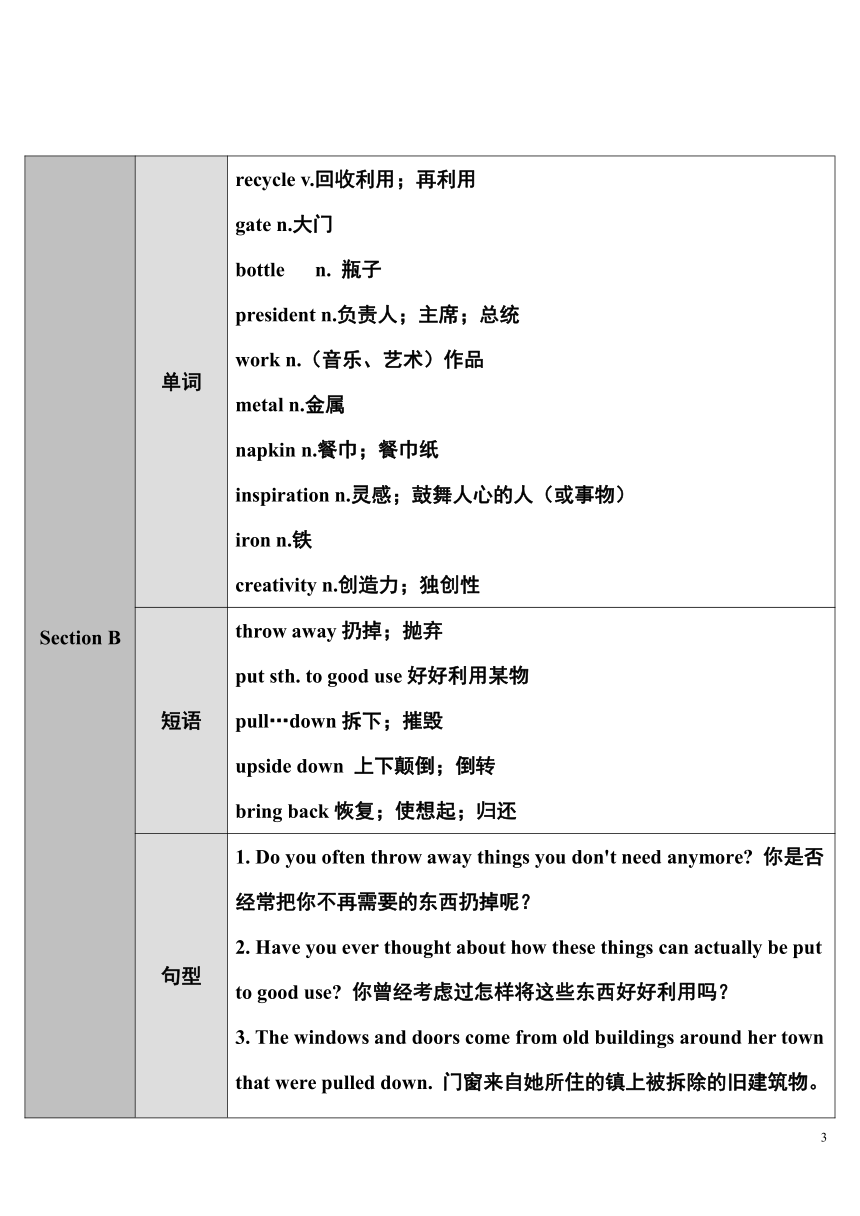
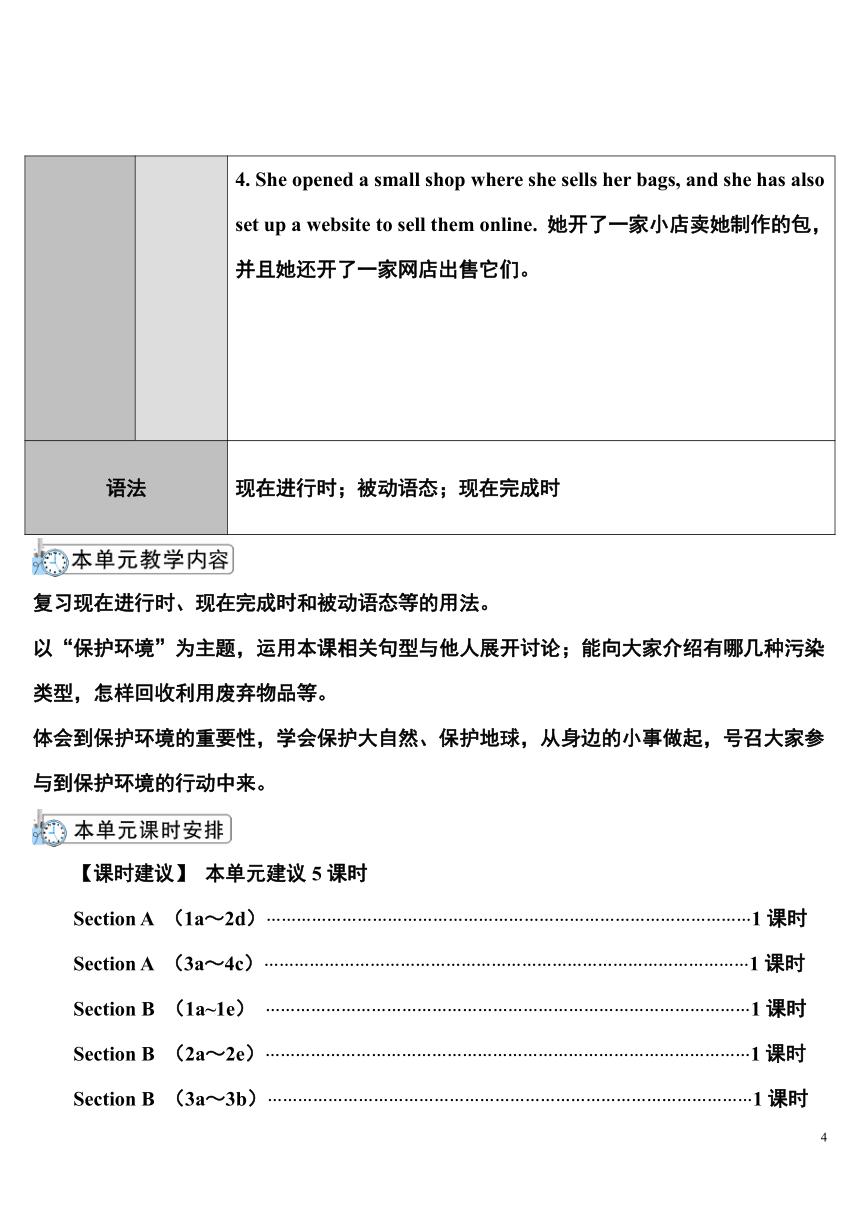
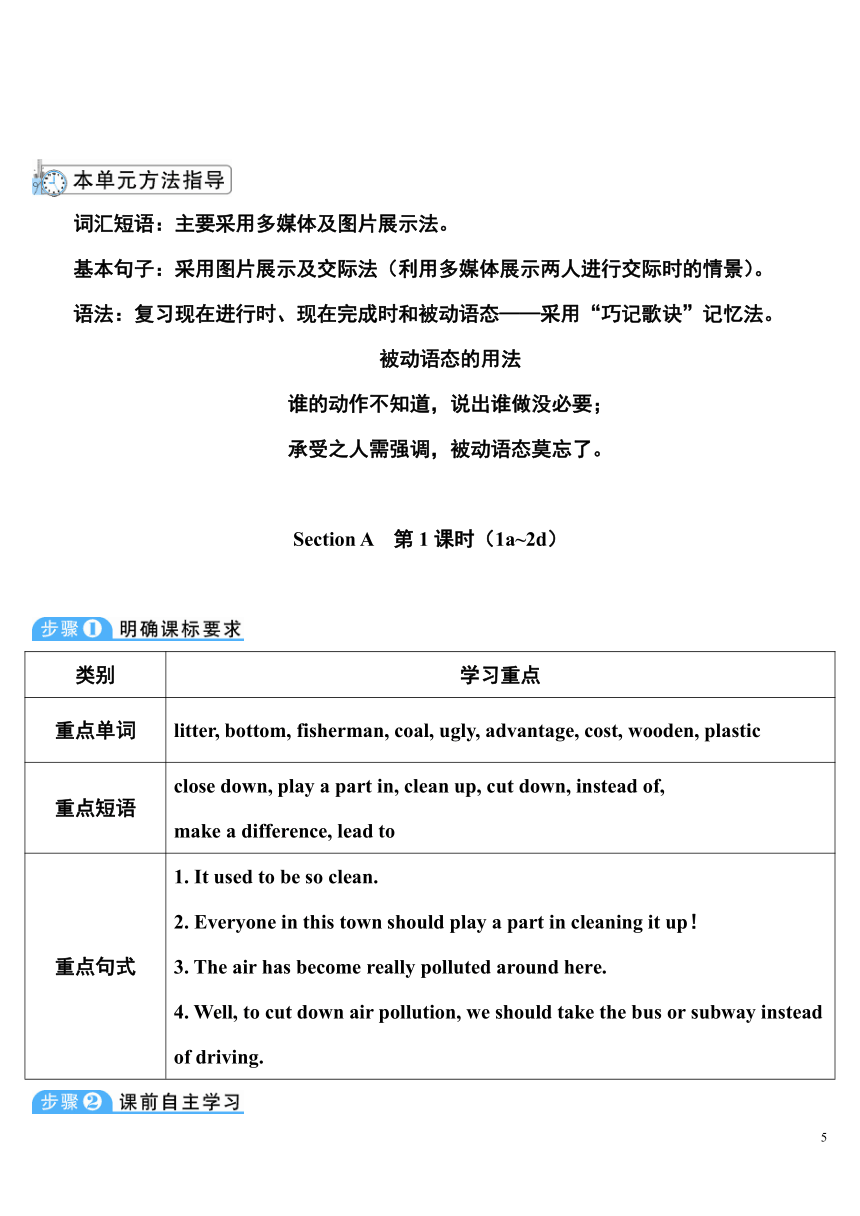
文档简介
第十三单元
Section A 单词 litter v.乱扔 n.垃圾;废弃物 bottom n.底部;最下部 fisherman n.渔民;钓鱼的人 coal n.煤;煤块 ugly adj.丑陋的;难看的 advantage n.优点;有利条件 cost v.花费 n.花费;价钱 wooden adj.木制的;木头的 plastic adj.塑料的 n.塑料;塑胶 cruel adj.残酷的;残忍的 harmful adj.有害的 industry n.工业; 行业 law n.法律;法规 scientific adj.科学上的;科学的 afford v.承担得起(后果);买得起 takeaway n.外卖食物 bin n.垃圾箱 shark n.鲨鱼 fin n.(鱼)鳍 chain n.链子;链条 ecosystem n.生态系统 reusable adj.可重复使用的;可再次使用的 transportation n.运输业;
短语 be harmful to对……有害 at the top of在……顶部或顶端 the food chain食物链 take part in参加 turn off关掉 pay for 付费;付出代价 take action采取行动
句型 1.We\'re trying to save the earth!我们正在努力拯救地球! 2.The air is badly polluted.这里的空气污染很严重。 3. No scientific studies have shown that shark fins are good for health. 没有科学研究表明鲨鱼鳍对健康有利。 4. We should help save the sharks. 我们应该帮助拯救鲨鱼。
Section B 单词 recycle v.回收利用;再利用 gate n.大门 bottle n. 瓶子 president n.负责人;主席;总统 work n.(音乐、艺术)作品 metal n.金属 napkin n.餐巾;餐巾纸 inspiration n.灵感;鼓舞人心的人(或事物) iron n.铁 creativity n.创造力;独创性
短语 throw away扔掉;抛弃 put sth. to good use好好利用某物 pull…down拆下;摧毁 upside down 上下颠倒;倒转 bring back恢复;使想起;归还
句型 1. Do you often throw away things you don't need anymore 你是否经常把你不再需要的东西扔掉呢? 2. Have you ever thought about how these things can actually be put to good use 你曾经考虑过怎样将这些东西好好利用吗? 3. The windows and doors come from old buildings around her town that were pulled down. 门窗来自她所住的镇上被拆除的旧建筑物。 4. She opened a small shop where she sells her bags, and she has also set up a website to sell them online. 她开了一家小店卖她制作的包,并且她还开了一家网店出售它们。
语法 现在进行时;被动语态;现在完成时
复习现在进行时、现在完成时和被动语态等的用法。
以“保护环境”为主题,运用本课相关句型与他人展开讨论;能向大家介绍有哪几种污染类型,怎样回收利用废弃物品等。
体会到保护环境的重要性,学会保护大自然、保护地球,从身边的小事做起,号召大家参与到保护环境的行动中来。
【课时建议】 本单元建议5课时
Section A (1a~2d)……………………………………………………………………………………1课时
Section A (3a~4c)……………………………………………………………………………………1课时
Section B (1a~1e) ……………………………………………………………………………………1课时
Section B (2a~2e)……………………………………………………………………………………1课时
Section B (3a~3b)……………………………………………………………………………………1课时
词汇短语:主要采用多媒体及图片展示法。
基本句子:采用图片展示及交际法(利用多媒体展示两人进行交际时的情景)。
语法:复习现在进行时、现在完成时和被动语态——采用“巧记歌诀”记忆法。
被动语态的用法
谁的动作不知道,说出谁做没必要;
承受之人需强调,被动语态莫忘了。
Section A 第1课时(1a~2d)
类别 学习重点
重点单词 litter, bottom, fisherman, coal, ugly, advantage, cost, wooden, plastic
重点短语 close down, play a part in, clean up, cut down, instead of, make a difference, lead to
重点句式 1. It used to be so clean. 2. Everyone in this town should play a part in cleaning it up! 3. The air has become really polluted around here. 4. Well, to cut down air pollution, we should take the bus or subway instead of driving.
课前预习 写一写 1.垃圾litter 2.底部bottom 3.渔民fisherman 4.煤coal 5.丑陋的ugly 6.优点advantage 7.花费cost 8.木制的wooden 9.塑料plastic
译一译 1.关闭close down 2.参与;起作用play a part in 3.打扫干净clean up 4.减少cut down 5.代替instead of 6.起作用;有影响make a difference 7.过去常常used to 8.通往;导致lead to
背一背 1.它过去是那么干净。 It used to be so clean. 2.这个镇上每个人都应该参与清理河流。 Everyone in this town should play a part in cleaning it up! 3.这附近的空气真的被污染了。 The air has become really polluted around here. 4.为了减少空气污染,我们应该乘公汽或地铁,而不开车。 To cut down air pollution, we should take the bus or subway instead of driving.
新课导入 There's more and more pollution in the world now, such as noise pollution, air pollution, water pollution and so on. Is there any pollution in your hometown Please discuss with your partner.
新课展示 【完成教材1a~1c的教学任务】 1.要求学生仔细看1a的图片,并完成相应练习。 2.请2~3名同学展示自己的答案,老师可做适当的补充并总结。 3.听录音,完成1b的练习,让学生模仿1c中的对话,用1a中的信息编造自己的对话,并请2~3组同学当堂演示。 典例参考 A: The street was so noisy. B: But it used to be quieter. A: Yes, but there are too many shops playing loud music. B: Everyone in this city should play a part in cutting down noise. 【语法提要】 1.used to used to为固定结构,意为“曾经;过去常常”,表示过去存在或经常发生但现在已经停止的行为或习惯,后接动词原形。 例句:We used to live in London. 我们曾在伦敦居住过。 She used to be really quiet, but now she is very outgoing. 她过去真的很文静,但是现在她很外向。 注意:used to不与表示过去的时间状语连用。它的否定结构为“主语 + didn't + use to+动词原形”;它的一般疑问结构为“Did+主语+use to+动词原形+其他?”或“Used+主语+to+动词原形+其他?”。 例句:She didn't use to / usedn't to come.她过去不常来。 Did he use to be a writer?=Used he to be a writer 他过去是名作家吗?
拓展:be / get used to sth. / doing sth.,表示“习惯于/适应于某事/ 做某事”。其中used是形容词,意为“习惯;适应”。 例句:I am used to getting up early. 我习惯早起。 You'll soon get/be used to his sense of humor. 你不久就会适应他的幽默感。 2.play a part in play a part in意为“参与某事;在……方面起作用”,后接名词、代词或v.-ing形式。play an active part in (doing) sth. “积极参与(做)某事”;play an important part in (doing) sth.“在(做)某事中发挥重要作用”。 例句:She plays an active part in politics. 她积极参与政治活动。 I want to play an active part in school activities. 我想积极参加学校活动。 Public transportation plays an important part in our daily life. 公共交通在我们的日常生活中发挥着重要作用。 【问题探究】 1. There used to be (过去有) so many trees on the hills. 2. We should play a part in cleaning (clean) the city up. 【完成教材2a~2d的教学任务】 1.要求学生翻开课本P98。播放第一遍录音,完成2a,2b的听力任务。 2.要求学生听第二遍录音,并逐句进行跟读。 3.听力内容巩固训练。要求学生根据所听到的内容完成下列各句。完成后要求若干学生给出自己的答案,以巩固对听力内容的理解。 (1) The air has become really polluted around there.
(2)I used to see the stars clearly. (3)People are also littering in public places. 4.大声朗读听力材料。 5.播放听力材料,要求学生模仿听力内容,利用2a,2b信息谈论空气污染情况,然后邀请2~3名同学当堂表演,看谁的表现最佳。 6.两人一组练习2d的对话,并让2~3组同学当堂表演。 7.教师根据学生的理解对其重难点进行讲解。 【语法提要】 1.cost cost作动词,意为花费,它的主语只能是物,不能是人。 辨析:take, spend, cost与pay 四者均用作动词,表“花费”,但其用法却大不相同。具体区别如下表: take常用it作形式主语常用于it takes/took sb. some time to do sth.“做某事花费某人多长时间”句型中spend其主语是人常用于spend some time/money doing sth.或spend some time/money on sth.“花费时间/金钱做某事”或“在某事/某物上花时间/金钱”句型中cost其主语是物常用于sth. cost(s) sb. some money “某事/某物花费某人多少钱”句型中pay其主语是人常用于sb. pay(s) some time/money for sth.“某人为某物花费多少时间/金钱”句型中
instead of作介词短语,意为“代替;而不是”,后面常跟名词、代词或v.?ing形式。instead of doing sth.意为“代替做某事”。 例句:She went to school instead of staying at home. 她没有待在家里而是去上学了。 辨析:instead of与instead instead of介词短语,其后可跟名词、代词或v.-ing形式。We can take a bus to work instead of driving. 我们可以坐公交车而不是开车去上班。instead副词,常位于句末,位于句首时,其后有逗号。He didn't reply. Instead, he left the room.他没回答,反而离开了房间。
【问题探究】 (A)1.(山东青岛中考)—How much is the ticket to Central Park —A one-way ticket______$40, and you can_____ another $20 for a round-trip. A. costs; pay B. cost; spend C. pay; spend D. spends; pay (B)2. We went to climb mountains _______going shopping. A. instead B. instead of C. prefer to D. take the place
活学活练 (A)1.(贵州黔西南州中考)Maria watch TV, but now she listening to music. A. used to; is used to B.is used to; used to C. used to; used to D.is used to; used to
(C)2.Everyone should play a part in the environment. A. protect B. protects C. protecting D. protected (B)3.(湖北十堰中考)—Smart phones are more and more popular now. —So they are. But they still _______ too much. A .pay B. cost C. take D. spend (C)4.We should be grateful(心存感激的) for what's right instead of______about what's plain B. complains C. complaining D. complained
布置作业:教师引导学生课后完成本课时对应练习,并预习下一课时内容。
教学反思 本课时通过听、说、读、写训练让学生对污染的词汇及其相关的语言知识有了初步的掌握,并能听懂和表达有关污染的现象、导致污染的原因及治理措施。
教学过程中老师的疑问:
教师点评和总结:
Section A 第2课时(3a~4c)
类别 学习重点
重点单词 cruel, harmful, industry, law, scientific, afford
重点短语 hear of, cut down, be harmful to, the food chain, at the top of, take part in, turn off, pay for, take action
重点句式 1. But in fact, around 70 million sharks are caught and traded in this industry every year. 2. The numbers of some kinds of sharks have fallen by over 90 percent in the last 20 to 30 years. 3. So far, no scientific studies have shown that shark fins are good for health, so why eat them
课前预习 写一写 1.残酷的cruel 2.有害的harmful 3.工业industry 4.法律law 5.科学的scientific 6.买得起afford
译一译 1.听说hear of 2.切掉cut off 3.食物链the food chain 4.对……有害be harmful to 5.在……顶部at the top of
背一背 1.有些种类的鲨鱼的数量在最近二三十年中下降了百分之九十以上。 The numbers of some kinds of sharks have fallen by over 90 percent in the last 20 to 30 years. 2.到目前为止,没有科学研究表明鲨鱼的鱼鳍对健康有益,所以为什么吃它们呢? So far,no scientific studies have shown that shark fins are good for health, so why eat them
新课导入 Teacher: Have you heard of the shark fin soup It comes from sharks. People catch the sharks, cut off the fins and throw the sharks back into the ocean. They are cruel and destroying the environment. If you want to learn more about it, let's learn the passage on P99.
新课展示 【完成教材3a~3b的教学任务】 1.要求学生快速默读短文,熟知大意,并完成课本3a的任务,然后邀请几位同学给出自己的答案,全班一起检查讨论。 2.先邀请几位同学朗读短文,教师要注意语音,及时纠正错误,然后播放录音,全班同学一起跟读。 3.再读短文,完成3b的任务,教师引导复习so, although, if, but, when等连词的用法。 4.短文内容巩固练习,教师将短文中重点短语及词汇空出,让学生不看书补充完成。 【完成教材Grammar Focus~4c的教学任务】 1.学生朗读语法句子,教师引导学生归纳语法知识,并完成相对应的练习。 2.学生独立完成4a~4c的任务,并列出清单。 【语法提要】 1.save save作动词,意为“救;拯救”,后常跟介词from。 例句:He saved the boy from the big fire.他从大火中救出了那个男孩。 2.cut off (1)切断(水、电);中断;关掉。 例句:Their water supply was cut off.他们的水源被切断了。 All communications are cut off.一切通讯都被切断了。 (2)切下来;剪下来。 例句:The rope is two feet longer than we needed,so we cut off the extra length. 绳子比我们需要的长两英尺,因此我们把多余的给剪下来了。
新课展示 3.take part in take part in意为“参加”,其后接名词或动名词。 例句:Did you take part in any activity 你参加过任何活动吗? 辨析:join, join in 与take part in join指参加某党派、团体或参军等,并且成为其中的一员He joined the army last year. 他去年参军了。join in指参加某项活动,但多指正在进行的活动I hope you can join in the discussion. 我希望你能参加这次讨论。take part in指参加某项活动(比赛)并在活动中起一定的作用Did you take part in the sports meeting yesterday 你昨天参加运动会了吗?
【问题探究】 (C)1.(福建泉州中考)—If we take a shower instead of bath, more water______. —I agree with you. A. has saved B. can save C. can be saved (A)2.I was______in the middle of the telephone call. A. cut off B. cut down C. cut in (C)3.People who______the sports meeting must be in good condition. A. join B. join in C. take part in
活学活练 凯特从树丛中剪下一些花。 Kate cut off some flowers from the bush. 2. The old lady donated all the money she B to the sick boy. A. has save; saving B. has saved; save C .have save; saving D. have saved; save 3.(甘肃白银中考)Many young people took part in A trees on Tree-Planting Day. A. planting B. plants C.to plant D. plant
布置作业:教师引导学生课后完成本课时对应练习,并预习下一课时内容。
教学反思 本课时主要是了解鲨鱼所处的生活环境及所面临的问题。通过多媒体展示及教师课堂设计,让学生在愉悦的环境下轻松地掌握了本课时重要语法点及语言知识点。
教学过程中老师的疑问:
教师点评和总结:
Section B 第3课时(1a~1e)
类别 学习重点
重点单词 recycle
重点短语 turn off, ride in cars
重点句式 1. Recycling paper is really easy. 2. But it's hard to stop riding in cars. 3. We really shouldn't use paper napkins, you know. 4.I stopped using them last year.
课前预习 写一写 回收利用;再利用recycle
译一译 1.关掉turn off 2.付费pay for 3.采取行动take action
背一背 1.回收再利用纸很容易。 Recycling paper is really easy. 2.但是停止坐车很难。 But it's hard to stop riding in cars. 3.我们不该用餐巾纸。 We shouldn't use paper napkins.
新课导入 教师利用多媒体工具呈现一些有关环境污染、交通拥挤、浪费水电等的画面,引导学生谈论画面中的现象。 The earth has been badly polluted. What can we do to save the earth Let's discuss about it…并把学生的答语写在黑板上。 1. We should take buses more. 2. We should turn off the lights when we leave the room. 3. We shouldn't use paper napkins. 4. We should recycle books and paper. 5. Turn off the shower while we are washing our hair. 6. We stop riding in cars. …
新课展示 【完成教材1a~1e的教学任务】 1.要求学生翻开课本P101,迅速阅读1a部分的内容并按要求完成课本上的相应任务。然后要求5~8名同学给出自己的答案,教师可以与学生一起讨论答案。 2.完成1b的任务。阐述他们的观点并依照1b的对话形式编写对话。老师请2~3组同学朗读他们的对话。 3.听第一遍录音,完成课本上1c部分的任务。 4.听第二遍录音,完成课本上1d部分的任务。 5.让学生模仿1e方框中的对话练习编写对话,并请3~4组同学展示他们的对话。(参
新课展示 考1c方框中的信息) 【语法提要】 1.stop doing sth.与stop to do sth.的区别 (1)stop doing sth.意为“停止做某事”,指停止正在做的事。 例句:Please stop talking. It's time to sleep.请停止讲话。到睡觉的时间了。 (2)stop to do sth.意为“停下来去做某事”,指停止正在做的事去做另外一件事。 例句:We have been working for a whole day. Let's stop to have a rest!我们已经工作了一整天了。让我们停下来休息一会吧! 2.动名词作主语 动名词作主语往往表示经常性、习惯性的动作,在口语中也可以表示具体的动作,谓语动词常用第三人称单数。 例句:Seeing is believing.眼见为实。 Recycling paper is very easy.回收利用纸张很容易。
新课展示 【问题探究】 1. My uncle is an environmentalist. He stopped using paper napkins last year. 2. Saving (save) endangered animals is very important now.
活学活练 ( B ) 1. You look tired! You should stop______your work and have a good rest! A. to do B. doing C. to doing D. do (D)2.(云南曲靖中考) vegetable juice is a good habit, which helps you keep a balanced diet. A. Drink B. Drank C. Drunk D. Drinking
布置作业:教师引导学生课后完成本课时对应练习,并预习下一课时内容。
教学反思 本课时让学生初步欣赏了英文诗歌,通过教师的引导,学生完全理解了本诗歌,也掌握了重要的语法知识。
教学过程中老师的疑问:
教师点评和总结:
Section B 第4课时(2a~2e)
类别 学习重点
重点单词 gate, bottle, president, work, metal
重点短语 throw away, pull…down, build sth. out of, put sth. to good use, be made of/from, set up, turn upside down, be known for, bring back to
重点句式 1. Have you ever thought about how these things can actually be put to good use 2. She has been doing this for a few years now.
课前预习 写一写 1.大门gate 2.瓶子bottle 3.负责人president 4.作品work 5.金属metal
译一译 1.拆下pull…down 2.好好利用put sth. to good use 3.由……制成be made of/from 4.倒转过来turn upside down
背一背 1.艾米不是唯一一个擅长回收再利用的人。 Amy isn't the only one who is good at recycling. 2.她现在做这事有几年了。 She has been doing this for a few years now.
新课导入 Teacher: Do you know how some people save energy and cut down pollution Today we will learn about Amy's, Jessica Wong's and Wang Tao's stories.
新课展示 【完成教材2a~2e的教学任务】 1.快速看2b中的图片,完成2a的任务。 2.要求学生快速阅读短文,完成2b练习。 3.先邀请几位同学朗读短文,教师要注意语音,及时纠正错误,然后播放录音,全班同学一起跟读。 4.再细读短文完成2c的任务,选用方框中的短语的正确形式补全2c中的短文。 5.教师讲解本课时的重难点。 6.读文章10分钟,完成2d任务。(注意词根) 7.以小组为单位讨论学生们需要做什么来保护环境。 8.教师让每个小组代表列出各组有关保护环境的措施,全班分享。 【语法提要】 1.be made of…意为“由……制成”。 例句:My sweater is made of wool.我的毛衣是由羊毛制成的。 辨析:be made of与be made from be made of指从原料到制成品没有发生本质变化,从成品上能够看得出原材料。The desk is made of wood. 这张桌子由木头制成。
新课展示 be made from表指从原料到制成品发生了质的变化,从成品上已看不出原材料。The wine is made from grapes. 这酒由葡萄制成。
拓展:(1)be made in…意为“产于……;于……制造”,后接表示地点的名词。 例句:This TV set is made in Shanghai.这台电视是上海制造的。 (2)be made into…意为“被制造成为……”。 例句:This piece of wood will be made into a small bench.这块木头将要被制成一个小长凳。 (3)be made by…意为“由……制成”,后接动作的执行者。 例句:The machine is made by the workers in the factory. 这台机器是由工厂里的工人们制造的。 2.be known for意为“以……而闻名”,可与be famous for互换,for后面接名词或v.-ing形式。 例句:He is known for his profound knowledge. 他以学问渊博而出名。 拓展:be known as与be famous as同义,意为“作为……而出名”。 例句:This area is known as/famous as the hometown of Chinese Wushu. 这个地区作为中国武术之乡而出名。 【问题探究】 1.大门是用石头和玻璃瓶做的。 The gate is made of rocks and glass bottles . 2.王涛因用来自旧车的铁做艺术品而闻名。 Wang Tao is known for using iron from the old cars to make art pieces.
活学活练 用适当的介词填空。 1. The desk was made of wood by my father in my home. 2. Thomas Alva Edison is known for his great inventions.
布置作业:教师引导学生课后完成本课时对应练习,并预习下一课时内容。
教学反思 本课时主要是训练学生的阅读理解能力与信息归纳能力。在教学过程中,通过教师的提问与引导,学生都能较好地掌握本节课的重难点,教学效果良好。
教学过程中老师的疑问:
教师点评和总结:
Section B 第5课时(3a~3b)
类别 学习重点
重点短语 need to, environmental problems
重点句式 1. Which parts of the town/city have a nice environment 2. Give suggestions or possible ways to solve the problems.
课 前 预 习 译一译 1.需要need to 2.环境问题environmental problems
背一背 1.城镇/城市的哪些部分环境好? Which parts of the town/city have a nice environment 2.给出解决这些问题的建议或可能的方法。 Give suggestions or possible ways to solve the problems.
新课导入 Teacher: There must be some nice places, and there are some places that need to be improved in your hometown. Describe the nice environment and the environmental problems in your hometown.
新课展示 【完成教材3a~3b的教学任务】 1.小组内互相交流自己家乡的环境,完成3a表格。 2.结合3a记录的内容,以及3b的提示写一篇作文,介绍自己家乡的环境。写完后小组内互相交流纠错,借鉴好词好句,教师抽查点拨。 典例参考 Dear Sir/Madam, Environmental problems are becoming more and more serious all over the world. With the development of the society, there are too many cars on the streets. Cars have made the air unhealthy for people to breathe. Black smoke from factories polluted the air seriously. Factories also put waste into the river. Now more and more people have realized these problems. I think that governments should develop laws to stop people from driving cars every day. I suggest everyone in this city should help to clean up the rivers and the streets. I hope the problem will be solved and our city will become better and better.
活学活练 ( D )Noise pollution can_______ hearing loss. cause to B. be harmful to C. be good for D. lead to
布置作业:教师引导学生课后完成本课时对应练习,并预习下一课时内容。
教学反思 本课时由谈论自己家乡的环境入手,既活跃了课堂气氛,又有利于学生口语表达能力和写作能力的提升。
教学过程中老师的疑问:
教师点评和总结:
5
Section A 单词 litter v.乱扔 n.垃圾;废弃物 bottom n.底部;最下部 fisherman n.渔民;钓鱼的人 coal n.煤;煤块 ugly adj.丑陋的;难看的 advantage n.优点;有利条件 cost v.花费 n.花费;价钱 wooden adj.木制的;木头的 plastic adj.塑料的 n.塑料;塑胶 cruel adj.残酷的;残忍的 harmful adj.有害的 industry n.工业; 行业 law n.法律;法规 scientific adj.科学上的;科学的 afford v.承担得起(后果);买得起 takeaway n.外卖食物 bin n.垃圾箱 shark n.鲨鱼 fin n.(鱼)鳍 chain n.链子;链条 ecosystem n.生态系统 reusable adj.可重复使用的;可再次使用的 transportation n.运输业;
短语 be harmful to对……有害 at the top of在……顶部或顶端 the food chain食物链 take part in参加 turn off关掉 pay for 付费;付出代价 take action采取行动
句型 1.We\'re trying to save the earth!我们正在努力拯救地球! 2.The air is badly polluted.这里的空气污染很严重。 3. No scientific studies have shown that shark fins are good for health. 没有科学研究表明鲨鱼鳍对健康有利。 4. We should help save the sharks. 我们应该帮助拯救鲨鱼。
Section B 单词 recycle v.回收利用;再利用 gate n.大门 bottle n. 瓶子 president n.负责人;主席;总统 work n.(音乐、艺术)作品 metal n.金属 napkin n.餐巾;餐巾纸 inspiration n.灵感;鼓舞人心的人(或事物) iron n.铁 creativity n.创造力;独创性
短语 throw away扔掉;抛弃 put sth. to good use好好利用某物 pull…down拆下;摧毁 upside down 上下颠倒;倒转 bring back恢复;使想起;归还
句型 1. Do you often throw away things you don't need anymore 你是否经常把你不再需要的东西扔掉呢? 2. Have you ever thought about how these things can actually be put to good use 你曾经考虑过怎样将这些东西好好利用吗? 3. The windows and doors come from old buildings around her town that were pulled down. 门窗来自她所住的镇上被拆除的旧建筑物。 4. She opened a small shop where she sells her bags, and she has also set up a website to sell them online. 她开了一家小店卖她制作的包,并且她还开了一家网店出售它们。
语法 现在进行时;被动语态;现在完成时
复习现在进行时、现在完成时和被动语态等的用法。
以“保护环境”为主题,运用本课相关句型与他人展开讨论;能向大家介绍有哪几种污染类型,怎样回收利用废弃物品等。
体会到保护环境的重要性,学会保护大自然、保护地球,从身边的小事做起,号召大家参与到保护环境的行动中来。
【课时建议】 本单元建议5课时
Section A (1a~2d)……………………………………………………………………………………1课时
Section A (3a~4c)……………………………………………………………………………………1课时
Section B (1a~1e) ……………………………………………………………………………………1课时
Section B (2a~2e)……………………………………………………………………………………1课时
Section B (3a~3b)……………………………………………………………………………………1课时
词汇短语:主要采用多媒体及图片展示法。
基本句子:采用图片展示及交际法(利用多媒体展示两人进行交际时的情景)。
语法:复习现在进行时、现在完成时和被动语态——采用“巧记歌诀”记忆法。
被动语态的用法
谁的动作不知道,说出谁做没必要;
承受之人需强调,被动语态莫忘了。
Section A 第1课时(1a~2d)
类别 学习重点
重点单词 litter, bottom, fisherman, coal, ugly, advantage, cost, wooden, plastic
重点短语 close down, play a part in, clean up, cut down, instead of, make a difference, lead to
重点句式 1. It used to be so clean. 2. Everyone in this town should play a part in cleaning it up! 3. The air has become really polluted around here. 4. Well, to cut down air pollution, we should take the bus or subway instead of driving.
课前预习 写一写 1.垃圾litter 2.底部bottom 3.渔民fisherman 4.煤coal 5.丑陋的ugly 6.优点advantage 7.花费cost 8.木制的wooden 9.塑料plastic
译一译 1.关闭close down 2.参与;起作用play a part in 3.打扫干净clean up 4.减少cut down 5.代替instead of 6.起作用;有影响make a difference 7.过去常常used to 8.通往;导致lead to
背一背 1.它过去是那么干净。 It used to be so clean. 2.这个镇上每个人都应该参与清理河流。 Everyone in this town should play a part in cleaning it up! 3.这附近的空气真的被污染了。 The air has become really polluted around here. 4.为了减少空气污染,我们应该乘公汽或地铁,而不开车。 To cut down air pollution, we should take the bus or subway instead of driving.
新课导入 There's more and more pollution in the world now, such as noise pollution, air pollution, water pollution and so on. Is there any pollution in your hometown Please discuss with your partner.
新课展示 【完成教材1a~1c的教学任务】 1.要求学生仔细看1a的图片,并完成相应练习。 2.请2~3名同学展示自己的答案,老师可做适当的补充并总结。 3.听录音,完成1b的练习,让学生模仿1c中的对话,用1a中的信息编造自己的对话,并请2~3组同学当堂演示。 典例参考 A: The street was so noisy. B: But it used to be quieter. A: Yes, but there are too many shops playing loud music. B: Everyone in this city should play a part in cutting down noise. 【语法提要】 1.used to used to为固定结构,意为“曾经;过去常常”,表示过去存在或经常发生但现在已经停止的行为或习惯,后接动词原形。 例句:We used to live in London. 我们曾在伦敦居住过。 She used to be really quiet, but now she is very outgoing. 她过去真的很文静,但是现在她很外向。 注意:used to不与表示过去的时间状语连用。它的否定结构为“主语 + didn't + use to+动词原形”;它的一般疑问结构为“Did+主语+use to+动词原形+其他?”或“Used+主语+to+动词原形+其他?”。 例句:She didn't use to / usedn't to come.她过去不常来。 Did he use to be a writer?=Used he to be a writer 他过去是名作家吗?
拓展:be / get used to sth. / doing sth.,表示“习惯于/适应于某事/ 做某事”。其中used是形容词,意为“习惯;适应”。 例句:I am used to getting up early. 我习惯早起。 You'll soon get/be used to his sense of humor. 你不久就会适应他的幽默感。 2.play a part in play a part in意为“参与某事;在……方面起作用”,后接名词、代词或v.-ing形式。play an active part in (doing) sth. “积极参与(做)某事”;play an important part in (doing) sth.“在(做)某事中发挥重要作用”。 例句:She plays an active part in politics. 她积极参与政治活动。 I want to play an active part in school activities. 我想积极参加学校活动。 Public transportation plays an important part in our daily life. 公共交通在我们的日常生活中发挥着重要作用。 【问题探究】 1. There used to be (过去有) so many trees on the hills. 2. We should play a part in cleaning (clean) the city up. 【完成教材2a~2d的教学任务】 1.要求学生翻开课本P98。播放第一遍录音,完成2a,2b的听力任务。 2.要求学生听第二遍录音,并逐句进行跟读。 3.听力内容巩固训练。要求学生根据所听到的内容完成下列各句。完成后要求若干学生给出自己的答案,以巩固对听力内容的理解。 (1) The air has become really polluted around there.
(2)I used to see the stars clearly. (3)People are also littering in public places. 4.大声朗读听力材料。 5.播放听力材料,要求学生模仿听力内容,利用2a,2b信息谈论空气污染情况,然后邀请2~3名同学当堂表演,看谁的表现最佳。 6.两人一组练习2d的对话,并让2~3组同学当堂表演。 7.教师根据学生的理解对其重难点进行讲解。 【语法提要】 1.cost cost作动词,意为花费,它的主语只能是物,不能是人。 辨析:take, spend, cost与pay 四者均用作动词,表“花费”,但其用法却大不相同。具体区别如下表: take常用it作形式主语常用于it takes/took sb. some time to do sth.“做某事花费某人多长时间”句型中spend其主语是人常用于spend some time/money doing sth.或spend some time/money on sth.“花费时间/金钱做某事”或“在某事/某物上花时间/金钱”句型中cost其主语是物常用于sth. cost(s) sb. some money “某事/某物花费某人多少钱”句型中pay其主语是人常用于sb. pay(s) some time/money for sth.“某人为某物花费多少时间/金钱”句型中
instead of作介词短语,意为“代替;而不是”,后面常跟名词、代词或v.?ing形式。instead of doing sth.意为“代替做某事”。 例句:She went to school instead of staying at home. 她没有待在家里而是去上学了。 辨析:instead of与instead instead of介词短语,其后可跟名词、代词或v.-ing形式。We can take a bus to work instead of driving. 我们可以坐公交车而不是开车去上班。instead副词,常位于句末,位于句首时,其后有逗号。He didn't reply. Instead, he left the room.他没回答,反而离开了房间。
【问题探究】 (A)1.(山东青岛中考)—How much is the ticket to Central Park —A one-way ticket______$40, and you can_____ another $20 for a round-trip. A. costs; pay B. cost; spend C. pay; spend D. spends; pay (B)2. We went to climb mountains _______going shopping. A. instead B. instead of C. prefer to D. take the place
活学活练 (A)1.(贵州黔西南州中考)Maria watch TV, but now she listening to music. A. used to; is used to B.is used to; used to C. used to; used to D.is used to; used to
(C)2.Everyone should play a part in the environment. A. protect B. protects C. protecting D. protected (B)3.(湖北十堰中考)—Smart phones are more and more popular now. —So they are. But they still _______ too much. A .pay B. cost C. take D. spend (C)4.We should be grateful(心存感激的) for what's right instead of______about what's plain B. complains C. complaining D. complained
布置作业:教师引导学生课后完成本课时对应练习,并预习下一课时内容。
教学反思 本课时通过听、说、读、写训练让学生对污染的词汇及其相关的语言知识有了初步的掌握,并能听懂和表达有关污染的现象、导致污染的原因及治理措施。
教学过程中老师的疑问:
教师点评和总结:
Section A 第2课时(3a~4c)
类别 学习重点
重点单词 cruel, harmful, industry, law, scientific, afford
重点短语 hear of, cut down, be harmful to, the food chain, at the top of, take part in, turn off, pay for, take action
重点句式 1. But in fact, around 70 million sharks are caught and traded in this industry every year. 2. The numbers of some kinds of sharks have fallen by over 90 percent in the last 20 to 30 years. 3. So far, no scientific studies have shown that shark fins are good for health, so why eat them
课前预习 写一写 1.残酷的cruel 2.有害的harmful 3.工业industry 4.法律law 5.科学的scientific 6.买得起afford
译一译 1.听说hear of 2.切掉cut off 3.食物链the food chain 4.对……有害be harmful to 5.在……顶部at the top of
背一背 1.有些种类的鲨鱼的数量在最近二三十年中下降了百分之九十以上。 The numbers of some kinds of sharks have fallen by over 90 percent in the last 20 to 30 years. 2.到目前为止,没有科学研究表明鲨鱼的鱼鳍对健康有益,所以为什么吃它们呢? So far,no scientific studies have shown that shark fins are good for health, so why eat them
新课导入 Teacher: Have you heard of the shark fin soup It comes from sharks. People catch the sharks, cut off the fins and throw the sharks back into the ocean. They are cruel and destroying the environment. If you want to learn more about it, let's learn the passage on P99.
新课展示 【完成教材3a~3b的教学任务】 1.要求学生快速默读短文,熟知大意,并完成课本3a的任务,然后邀请几位同学给出自己的答案,全班一起检查讨论。 2.先邀请几位同学朗读短文,教师要注意语音,及时纠正错误,然后播放录音,全班同学一起跟读。 3.再读短文,完成3b的任务,教师引导复习so, although, if, but, when等连词的用法。 4.短文内容巩固练习,教师将短文中重点短语及词汇空出,让学生不看书补充完成。 【完成教材Grammar Focus~4c的教学任务】 1.学生朗读语法句子,教师引导学生归纳语法知识,并完成相对应的练习。 2.学生独立完成4a~4c的任务,并列出清单。 【语法提要】 1.save save作动词,意为“救;拯救”,后常跟介词from。 例句:He saved the boy from the big fire.他从大火中救出了那个男孩。 2.cut off (1)切断(水、电);中断;关掉。 例句:Their water supply was cut off.他们的水源被切断了。 All communications are cut off.一切通讯都被切断了。 (2)切下来;剪下来。 例句:The rope is two feet longer than we needed,so we cut off the extra length. 绳子比我们需要的长两英尺,因此我们把多余的给剪下来了。
新课展示 3.take part in take part in意为“参加”,其后接名词或动名词。 例句:Did you take part in any activity 你参加过任何活动吗? 辨析:join, join in 与take part in join指参加某党派、团体或参军等,并且成为其中的一员He joined the army last year. 他去年参军了。join in指参加某项活动,但多指正在进行的活动I hope you can join in the discussion. 我希望你能参加这次讨论。take part in指参加某项活动(比赛)并在活动中起一定的作用Did you take part in the sports meeting yesterday 你昨天参加运动会了吗?
【问题探究】 (C)1.(福建泉州中考)—If we take a shower instead of bath, more water______. —I agree with you. A. has saved B. can save C. can be saved (A)2.I was______in the middle of the telephone call. A. cut off B. cut down C. cut in (C)3.People who______the sports meeting must be in good condition. A. join B. join in C. take part in
活学活练 凯特从树丛中剪下一些花。 Kate cut off some flowers from the bush. 2. The old lady donated all the money she B to the sick boy. A. has save; saving B. has saved; save C .have save; saving D. have saved; save 3.(甘肃白银中考)Many young people took part in A trees on Tree-Planting Day. A. planting B. plants C.to plant D. plant
布置作业:教师引导学生课后完成本课时对应练习,并预习下一课时内容。
教学反思 本课时主要是了解鲨鱼所处的生活环境及所面临的问题。通过多媒体展示及教师课堂设计,让学生在愉悦的环境下轻松地掌握了本课时重要语法点及语言知识点。
教学过程中老师的疑问:
教师点评和总结:
Section B 第3课时(1a~1e)
类别 学习重点
重点单词 recycle
重点短语 turn off, ride in cars
重点句式 1. Recycling paper is really easy. 2. But it's hard to stop riding in cars. 3. We really shouldn't use paper napkins, you know. 4.I stopped using them last year.
课前预习 写一写 回收利用;再利用recycle
译一译 1.关掉turn off 2.付费pay for 3.采取行动take action
背一背 1.回收再利用纸很容易。 Recycling paper is really easy. 2.但是停止坐车很难。 But it's hard to stop riding in cars. 3.我们不该用餐巾纸。 We shouldn't use paper napkins.
新课导入 教师利用多媒体工具呈现一些有关环境污染、交通拥挤、浪费水电等的画面,引导学生谈论画面中的现象。 The earth has been badly polluted. What can we do to save the earth Let's discuss about it…并把学生的答语写在黑板上。 1. We should take buses more. 2. We should turn off the lights when we leave the room. 3. We shouldn't use paper napkins. 4. We should recycle books and paper. 5. Turn off the shower while we are washing our hair. 6. We stop riding in cars. …
新课展示 【完成教材1a~1e的教学任务】 1.要求学生翻开课本P101,迅速阅读1a部分的内容并按要求完成课本上的相应任务。然后要求5~8名同学给出自己的答案,教师可以与学生一起讨论答案。 2.完成1b的任务。阐述他们的观点并依照1b的对话形式编写对话。老师请2~3组同学朗读他们的对话。 3.听第一遍录音,完成课本上1c部分的任务。 4.听第二遍录音,完成课本上1d部分的任务。 5.让学生模仿1e方框中的对话练习编写对话,并请3~4组同学展示他们的对话。(参
新课展示 考1c方框中的信息) 【语法提要】 1.stop doing sth.与stop to do sth.的区别 (1)stop doing sth.意为“停止做某事”,指停止正在做的事。 例句:Please stop talking. It's time to sleep.请停止讲话。到睡觉的时间了。 (2)stop to do sth.意为“停下来去做某事”,指停止正在做的事去做另外一件事。 例句:We have been working for a whole day. Let's stop to have a rest!我们已经工作了一整天了。让我们停下来休息一会吧! 2.动名词作主语 动名词作主语往往表示经常性、习惯性的动作,在口语中也可以表示具体的动作,谓语动词常用第三人称单数。 例句:Seeing is believing.眼见为实。 Recycling paper is very easy.回收利用纸张很容易。
新课展示 【问题探究】 1. My uncle is an environmentalist. He stopped using paper napkins last year. 2. Saving (save) endangered animals is very important now.
活学活练 ( B ) 1. You look tired! You should stop______your work and have a good rest! A. to do B. doing C. to doing D. do (D)2.(云南曲靖中考) vegetable juice is a good habit, which helps you keep a balanced diet. A. Drink B. Drank C. Drunk D. Drinking
布置作业:教师引导学生课后完成本课时对应练习,并预习下一课时内容。
教学反思 本课时让学生初步欣赏了英文诗歌,通过教师的引导,学生完全理解了本诗歌,也掌握了重要的语法知识。
教学过程中老师的疑问:
教师点评和总结:
Section B 第4课时(2a~2e)
类别 学习重点
重点单词 gate, bottle, president, work, metal
重点短语 throw away, pull…down, build sth. out of, put sth. to good use, be made of/from, set up, turn upside down, be known for, bring back to
重点句式 1. Have you ever thought about how these things can actually be put to good use 2. She has been doing this for a few years now.
课前预习 写一写 1.大门gate 2.瓶子bottle 3.负责人president 4.作品work 5.金属metal
译一译 1.拆下pull…down 2.好好利用put sth. to good use 3.由……制成be made of/from 4.倒转过来turn upside down
背一背 1.艾米不是唯一一个擅长回收再利用的人。 Amy isn't the only one who is good at recycling. 2.她现在做这事有几年了。 She has been doing this for a few years now.
新课导入 Teacher: Do you know how some people save energy and cut down pollution Today we will learn about Amy's, Jessica Wong's and Wang Tao's stories.
新课展示 【完成教材2a~2e的教学任务】 1.快速看2b中的图片,完成2a的任务。 2.要求学生快速阅读短文,完成2b练习。 3.先邀请几位同学朗读短文,教师要注意语音,及时纠正错误,然后播放录音,全班同学一起跟读。 4.再细读短文完成2c的任务,选用方框中的短语的正确形式补全2c中的短文。 5.教师讲解本课时的重难点。 6.读文章10分钟,完成2d任务。(注意词根) 7.以小组为单位讨论学生们需要做什么来保护环境。 8.教师让每个小组代表列出各组有关保护环境的措施,全班分享。 【语法提要】 1.be made of…意为“由……制成”。 例句:My sweater is made of wool.我的毛衣是由羊毛制成的。 辨析:be made of与be made from be made of指从原料到制成品没有发生本质变化,从成品上能够看得出原材料。The desk is made of wood. 这张桌子由木头制成。
新课展示 be made from表指从原料到制成品发生了质的变化,从成品上已看不出原材料。The wine is made from grapes. 这酒由葡萄制成。
拓展:(1)be made in…意为“产于……;于……制造”,后接表示地点的名词。 例句:This TV set is made in Shanghai.这台电视是上海制造的。 (2)be made into…意为“被制造成为……”。 例句:This piece of wood will be made into a small bench.这块木头将要被制成一个小长凳。 (3)be made by…意为“由……制成”,后接动作的执行者。 例句:The machine is made by the workers in the factory. 这台机器是由工厂里的工人们制造的。 2.be known for意为“以……而闻名”,可与be famous for互换,for后面接名词或v.-ing形式。 例句:He is known for his profound knowledge. 他以学问渊博而出名。 拓展:be known as与be famous as同义,意为“作为……而出名”。 例句:This area is known as/famous as the hometown of Chinese Wushu. 这个地区作为中国武术之乡而出名。 【问题探究】 1.大门是用石头和玻璃瓶做的。 The gate is made of rocks and glass bottles . 2.王涛因用来自旧车的铁做艺术品而闻名。 Wang Tao is known for using iron from the old cars to make art pieces.
活学活练 用适当的介词填空。 1. The desk was made of wood by my father in my home. 2. Thomas Alva Edison is known for his great inventions.
布置作业:教师引导学生课后完成本课时对应练习,并预习下一课时内容。
教学反思 本课时主要是训练学生的阅读理解能力与信息归纳能力。在教学过程中,通过教师的提问与引导,学生都能较好地掌握本节课的重难点,教学效果良好。
教学过程中老师的疑问:
教师点评和总结:
Section B 第5课时(3a~3b)
类别 学习重点
重点短语 need to, environmental problems
重点句式 1. Which parts of the town/city have a nice environment 2. Give suggestions or possible ways to solve the problems.
课 前 预 习 译一译 1.需要need to 2.环境问题environmental problems
背一背 1.城镇/城市的哪些部分环境好? Which parts of the town/city have a nice environment 2.给出解决这些问题的建议或可能的方法。 Give suggestions or possible ways to solve the problems.
新课导入 Teacher: There must be some nice places, and there are some places that need to be improved in your hometown. Describe the nice environment and the environmental problems in your hometown.
新课展示 【完成教材3a~3b的教学任务】 1.小组内互相交流自己家乡的环境,完成3a表格。 2.结合3a记录的内容,以及3b的提示写一篇作文,介绍自己家乡的环境。写完后小组内互相交流纠错,借鉴好词好句,教师抽查点拨。 典例参考 Dear Sir/Madam, Environmental problems are becoming more and more serious all over the world. With the development of the society, there are too many cars on the streets. Cars have made the air unhealthy for people to breathe. Black smoke from factories polluted the air seriously. Factories also put waste into the river. Now more and more people have realized these problems. I think that governments should develop laws to stop people from driving cars every day. I suggest everyone in this city should help to clean up the rivers and the streets. I hope the problem will be solved and our city will become better and better.
活学活练 ( D )Noise pollution can_______ hearing loss. cause to B. be harmful to C. be good for D. lead to
布置作业:教师引导学生课后完成本课时对应练习,并预习下一课时内容。
教学反思 本课时由谈论自己家乡的环境入手,既活跃了课堂气氛,又有利于学生口语表达能力和写作能力的提升。
教学过程中老师的疑问:
教师点评和总结:
5
同课章节目录
- Unit 1 How can we become good learners.
- Section A
- Section B
- Unit 2 I think that mooncakes are delicious!
- Section A
- Section B
- Unit 3 Could you please tell me where the restroom
- Section A
- Section B
- Unit 4 I used to be afraid of the dark.
- Section A
- Section B
- Unit 5 What are the shirts made of?
- Section A
- Section B
- Review of Units 1-5
- Unit 6 When was it invented?
- Section A
- Section B
- Unit 7 Teenagers should be allowed to choose their
- Section A
- Section B
- Unit 8 It must belong to Carla.
- Section A
- Section B
- Unit 9 I like music that I can dance to.
- Section A
- Section B
- Unit 10 You're supposed to shake hands.
- Section A
- Section B
- Review of Units 6-10
- Unit 11 Sad movies make me cry.
- Section A
- Section B
- Unit 12 Life is full of the unexpected
- Section A
- Section B
- Unit 13 We're trying to save the earth!
- Section A
- Section B
- Unit 14 I remember meeting all of you in Grade 7.
- Section A
- Section B
- Review of Units 11-14
